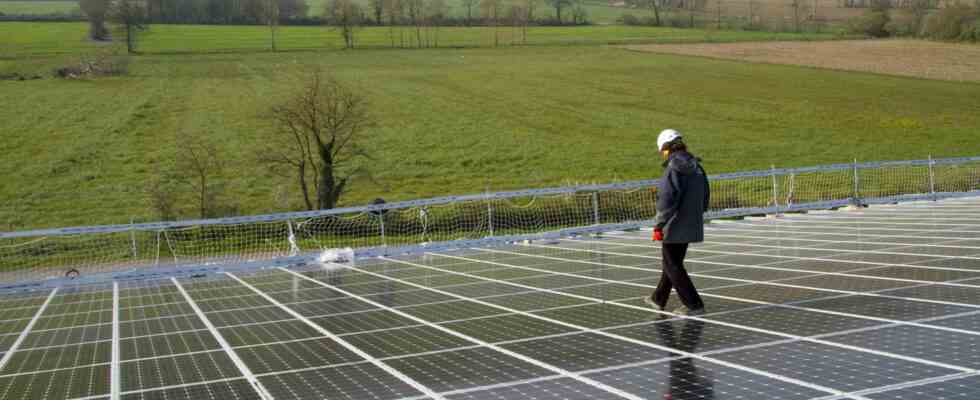The National Assembly adopted in first reading, Tuesday January 10 at the end of the day, the bill relating to the acceleration of the production of renewable energies. The text received 286 votes for and 238 votes against. The vote was disrupted by technical incidents, which led to the organization of a vote by paper ballots and not by electronic means as is usually the case.
The bill provides in particular:
- a status of “imperative reason of major public interest (RIIPM)” for certain renewable energy projects in order to limit appeals;
- to facilitate the development of offshore wind power;
- new criteria for the installation of onshore wind turbines, for example by encouraging communities to “take care to limit the effects of visual saturation” ;
- “acceleration zones” for installing renewable energies, subject to the approval of the municipalities concerned;
- to develop photovoltaics, with the obligation to install solar panels in outdoor car parks of more than 1,500 m², easier installation near motorways and major roads as well as in mountain towns;
- re agrivoltaism (production of electricity on agricultural land)the text affirms that agricultural production must remain “main activity”, and facilities must be “reversible” ;
- financing by promoters of renewable energies of green projects or projects for the protection of the biodiversity of municipalities and intermunicipalities where they wish to set up facilities;
- the installation of an observatory and a mediator of renewable energies.
In the morning, the Socialist deputies had announced that they would support the text, unlike the other left-wing forces, divided between opposition and abstention. “There are times to cooperate in the name of the general interest and the ecological emergency. (…) This law has been the subject of a real work of dialogue between the different political camps and with the government”estimated the PS deputy Dominique Potier, who claims “major advances” thanks to his group’s 70 amendments. What relieve the executive, which counts the forces present before the solemn ballot organized at the end of the afternoon, at the same time as Elisabeth Borne’s press conference to present her very controversial pension reform project.
The text on renewable energies “accelerates projects by several years. (…) That’s a fact. So either the opposition groups [de gauche] are consistent with their presidential and legislative program (…), either they remain in the political posture and choose the opposition in principle”said Monday the Minister of Energy Transition, Agnès Pannier-Runacher.
Environmentalists had promised a “abstaining from waiting” to ” put pressure “. “We expect better”, for example on the deployment of renewable energies on existing buildings, underlines the head of Europe Ecology-The Greens (EELV), Marine Tondelier. The “rebellious” had announced to vote against, believing that the text “gives pride of place to the commodification of renewable energies”like the Communists, who denounced a “privatization” Energy.
The Senate, with a majority on the right, had largely voted for the text devoted to renewable energies in early November 2022, with the help of socialist, environmentalist and communist senators. But the LR deputies have adopted a harder line than their colleagues in the Senate. They dispute “unjustified derogations granted to wind power”a “intermittent energy” and one “salami” texts on renewable energies.
After the green light from the Assembly, a mixed commission bringing together seven deputies and seven senators – where the right has the majority – must now meet, a priori on January 24, to try to establish a compromise text, with a view to final adoption.
Priority “acceleration” zones
This bill aims to reduce installation times and make up for France’s significant delay in terms of renewable energies: 19.3% of gross final energy consumption, well below its European neighbours.
The text insists in particular on photovoltaics and wind power at sea, in line with the ambition displayed by Emmanuel Macron to multiply by ten by 2050 the production capacity of solar energy to exceed 100 GW and to deploy 50 offshore wind farms to reach 40 GW.
Among the main debates: the sensitive subject of the approval of mayors before installing onshore wind turbines and solar panels. In line with a compromise found in the Senate, the Assembly validated a planning system, with areas of“acceleration” priorities for installing renewable energies, subject to the approval of the municipalities. The measure has tensed the left, which fears the return of the “mayor’s veto” that the LR deputies demanded for the whole of the territory. The NGO WWF generally judges “interesting but unfinished exercise” and sees in the planning system with the municipalities “a bit of a gas plant”.
Newsletter
” Human warmth “
How to face the climate challenge? Each week, our best articles on the subject
Register
On the professional side, the president of the renewable energies union, Jules Nyssen, reports to ” good points “ on access to land for photovoltaics, but also “setbacks” and ” Vigilant point “, for example the withdrawal of the rebate on the invoice of local residents. The Assembly favored a socialist proposal to finance broader territorial measures: funds for households in fuel poverty or for biodiversity.

